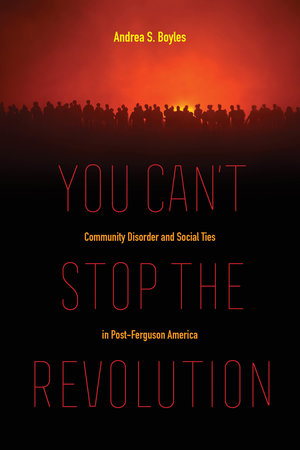By Andrea S. Boyles, author of recent book You Can’t Stop the Revolution: Community Disorder and Social Ties in Post-Ferguson American and previous book Race, Place, and Suburban Policing: Too Close for Comfort
I am Andrea S. Boyles, a Black feminist race scholar, sociologist and critical criminologist. My work challenges early thought across disciplines and largely, the structuring of society. It is also community-centered, evolutionary, and transformative, much like the Black participants in my projects. Many of them work in the trenches—on the ground, pre- and post-Ferguson—as drivers of social services and change in the Black community.
In my community, abolition is not a new idea. This movement dates back to enslavement and in recent times, has been mostly associated with ending the prison industrial complex (PIC) and mass incarceration. Police abolition is thematic to that. In fact, it’s a topic that I purposefully highlighted while responding to critics at my Author-Meets-Critics session at the annual American Society of Criminology (ASC) conference back in November 2019. The mention provoked discomfort and questions, as some in the audience were unaware of the movement. At the time, I did not delve into the particulars or detail the nuanced suggestions from “the streets” or otherwise. We were nearing the end of the session. Instead, I urged folks to “get educated on it” and “ready for it” because it was coming. I said they would definitely hear about it again.
And now, here we are.
Today, police abolition dominates headlines around the nation. Some cities are moving toward defunding departments in response to the public call for justice for the murder of George Floyd and many black lives at the hands of the police. The critical consensus and movement behind it is that police agencies, or the criminal justice system largely is not broken, as often suggested. Rather it rightly functions as it was historically constructed; as an exorbitantly funded, inherently discriminative system designed to oppressively control Black people and people of color generally (e.g. slave patrol, convict leasing, chain gangs).
Police abolition moves to deconstruct this arrangement, and begin anew with community and social service-centered approaches. Defunding is one component of abolition. My work outlines the reasons behind the now eventual call for it, based on years of participant observation and community-engagement. I account for the political “disordering” of needs in community development, at the detriment of poor Black neighborhoods especially. You Can’t Stop the Revolution: Community Disorder and Social Ties in Post-Ferguson America offers an evidence-based holistic take and implications for decreasing the role(s) of police and increasing social services.
Here’s an excerpt from the book to help understand the case for police abolition:
…the police are often tasked by their respective cities with many social service responsibilities. Despite the overall neglect of social services, the police should not be regarded as a convenient, though inadequate, go-to for addressing mental illness, addiction, the unhoused, and other issues. They are not trained to do this, and therefore jail and criminalization have become temporary fixes…We cannot arrest our way out of inequity, inequality, and structural inadequency. The desperation of populations who may be dealing with those adverse conditions, combined with few or inadequately trained law enforcement, creates a situation ripe for havoc. Considered critically, why would police officers be expected to manage and handle situations for which they are obviously not trained? These often-difficult circumstances and conditions (e.g., addiction, mental illness, unhousing) call for specialized help or targeted care from professionals that is often well beyond the purview of law enforcement…they are situated as “babysitters”—an actionable insult to Black communities. It is as if the idea is to keep both parties—police and black citizens—busy fighting one another…Policing cannot be a one-stop-shop solution for addressing discrimination or community disorder, crime, and its effects. In many respects, the police agenda and tactics (e.g., brutality, police paramilitary units) reflect and are also effects of disorder, and therefore the police engage in ways that exacerbate disparagement of black citizen neighborhoods and communities. The answer lies in institutional policies and practices that support community infrastructure and implementation of black interests and all-inclusive social services.
To read more, check out You Can’t Stop the Revolution: Community Disorder and Social Ties in Post-Ferguson American
Note: For more on context on chain gangs, watch the 2016 documentary 13th by Ava DuVernay. Also read Childs, Dennis. 2015. Slaves of the State: Black Incarceration from the Chain Gang to the Penitentiary, University of Minnesota Press; and SLAVERY by Another Name, PBS.

